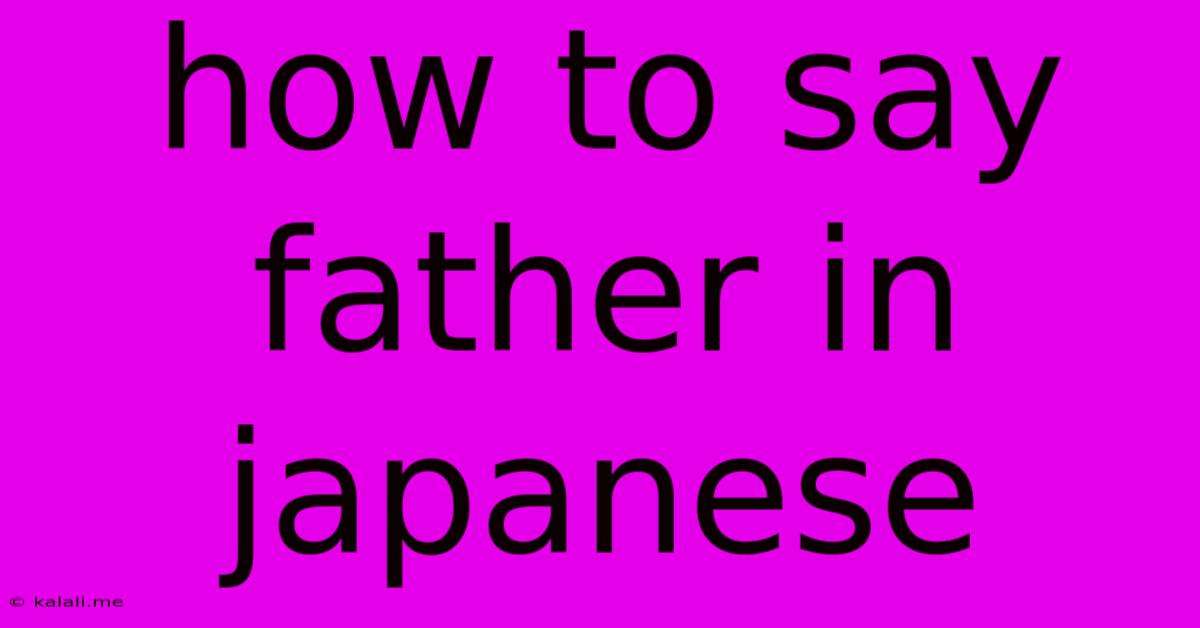How To Say Father In Japanese
Kalali
May 25, 2025 · 2 min read

Table of Contents
How to Say Father in Japanese: A Comprehensive Guide
This article will explore the various ways to say "father" in Japanese, delving into nuances of formality and context. Understanding these differences is crucial for effective communication and avoiding potential misunderstandings. This guide provides more than just a simple translation; it offers a deeper understanding of Japanese familial terms.
There isn't one single perfect translation for "father" in Japanese, as the appropriate word depends heavily on the context and your relationship with the person you're addressing. Let's explore the most common options:
1. お父さん (Otōsan): The Most Common Way to Say Father
Otōsan (お父さん) is the most common and widely used term for "father." It's generally used by children when speaking to or about their father. It's casual and affectionate, suitable for everyday conversations within the family. Think of it as the equivalent of "Dad" or "Papa" in English. You'll hear this used frequently in anime, manga, and everyday Japanese life.
2. 父 (Chichi): A More Formal Option
Chichi (父) is a more formal and literary way to refer to one's father. This term is less common in everyday speech and is more appropriate for formal settings, written documents, or when addressing your father in a very respectful manner. It's a more distant and less affectionate term than Otōsan. You might see this used in formal announcements or literature.
3. パパ (Papa): A Modern and Affectionate Alternative
Papa (パパ) is a borrowed word from English, and it's a more modern and arguably more affectionate term for "father." Similar to Otōsan, it’s used in casual settings and often by younger children. It carries a similar connotation to "Papa" or "Daddy" in English.
4. お父様 (Otōsama): The Highly Respectful Form
Otōsama (お父様) is the most polite and respectful way to refer to someone else's father. This term is used when speaking about someone's father, particularly if that person is older or holds a higher social standing than yourself. It shows a significant level of deference and respect. Using this term demonstrates good manners and consideration in Japanese culture.
Choosing the Right Word: Context is Key
The choice of which term to use depends entirely on the context. Consider these factors:
- Your relationship with the person: Are you speaking to your own father, or someone else's?
- The setting: Is it a formal or informal situation?
- Your age and the age of the person you are addressing: Younger children might use Papa or Otōsan, while adults might use Chichi or Otōsama depending on the situation.
Understanding these nuances allows for more natural and appropriate communication in Japanese. While Otōsan serves as a great starting point, learning the other terms enhances your understanding of Japanese culture and demonstrates respect for the complexities of the language. Remember that practice makes perfect! The more you hear and use these words, the more comfortable you will become with choosing the right one.
Latest Posts
Latest Posts
-
Why Do Missionaries Come In Pares
May 26, 2025
-
Fallout 4 X01 Power Armor Location
May 26, 2025
-
Best Day Of The Week To Buy Airline Tickets
May 26, 2025
-
Can I Remove Neighbors Fence On My Property
May 26, 2025
-
400 Ohms Between 5v Positive And 5v Negative
May 26, 2025
Related Post
Thank you for visiting our website which covers about How To Say Father In Japanese . We hope the information provided has been useful to you. Feel free to contact us if you have any questions or need further assistance. See you next time and don't miss to bookmark.